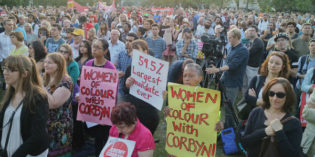Tag: Elections

Elections and Covid-19: making democracy work in uncertain times
Erik Asplund and Toby James discuss the dilemmas countries around the globe face about holding or postponing elections during the pandemic, and set out some guidelines to follow in ensuring democratic participation remains fair and open during the crisis.

Who wastes their vote?
In their recent study, Corinna Kroeber, Cal Le Gall and Sarah C. Dingler analyse the similarities and differences of voters who do not make their vote count by voting for a party or candidate unlikely to win an election. Studying voting behaviour in three European democracies with different majoritarian electoral systems, namely the United Kingdom, Germany and France, they show that the archetypical ‘ballot wasters’ are the young and men.

Have we all underestimated the severity of socioeconomic differences in electoral participation?
Opinion polls routinely overestimate voter turnout, since participants misreport their own voting record, and because politically engaged voters are also more likely to respond to surveys. Using unique linked survey and register-based data from Finland that allows them to measure the effects of these biases, Hannu Lahtinen, Pekka Martikainen, Mikko Mattila, Hanna Wass, and Lauri Rapeli demonstrate that these two factors also lead to an underestimation of socioeconomic differences in turnout. The results imply that social inequality in political participation is a greater social challenge than previously thought.

Do electoral results come as a surprise because our empirical models are limited?
Recent elections in many European countries have seemed less predictable, as party systems fragment and new parties challenge the established ones on a range of issues. Looking at the recent case of Finland, Zhen Im, Hanna Wass, Heikki Hiilamo and Timo Kauppinen argue that political scientists need to develop new models for mapping multiple, changing issues for electoral competition.

Party preferences and prior expectations moderate voters’ perceptions of winning and losing an election
What is the relationship between who you vote for in an election and satisfaction with the outcome? Looking at evidence from four countries, which span both majoritarian and proportional systems, Carolina Plescia finds that, beyond objective measures of party outcome, public opinion on which party has won or lost is affected by a party’s change in vote share, voters’ expectations, existing party preferences and the electoral system under which it is contested.

Book Review | The British General Election of 2017 by Philip Cowley and Dennis Kavanagh
In The British General Election of 2017, the latest in the venerable Nuffield series on British elections since 1945, Philip Cowley and Dennis Kavanagh explore one of the most extraordinary political events of the young century in the UK: the British general election of 2017. While not able to produce a fully coherent explanation of the results, the volume achieves the same skillful blend of narrative and analysis that we have come to expect from the series, with the help of excellent sourcing and well-chosen specialist contributors, writes Lawrence McKay.

Why don’t immigrants vote more?
There are relatively few cases where non-citizen immigrants can vote in municipal elections, but where they can participation tends to be low. Didier Ruedin assesses the case of Geneva, where he finds that, even accounting for social origin, engagement, civic integration and socialisation, there is a gap in participation that needs further explanation.

England’s local elections 2018: the Lib Dems’ performance was underwhelming – but these were not the elections to judge the party on
Despite media headlines to the contrary, the Liberal Democrats’ performance in the recent local elections was pretty underwhelming, explains David Cutts. But it is the 2019 local elections that will tell us more about the long-term viability of the party, since those will concern a larger number of English districts where the Lib Dems will be seeking to reclaim ground lost to the Conservatives since 2010.

Increasing ethnic minority representation: why both political parties and electoral districts matter
National parliaments in Western democracies remain far whiter than the increasingly diverse populations they represent. Benjamin Farrer (Knox College) and Josh Zingher (Old Dominion University) find that the explanation for this lies in the interaction of local demographics and political parties, and that as a result centre-left parties in the US, UK and Australia have been more successful at getting ethnic minority candidates elected.



 Democratic Audit's core funding is provided by the Joseph Rowntree Charitable Trust. Additional funding is provided by the London School of Economics.
Democratic Audit's core funding is provided by the Joseph Rowntree Charitable Trust. Additional funding is provided by the London School of Economics.